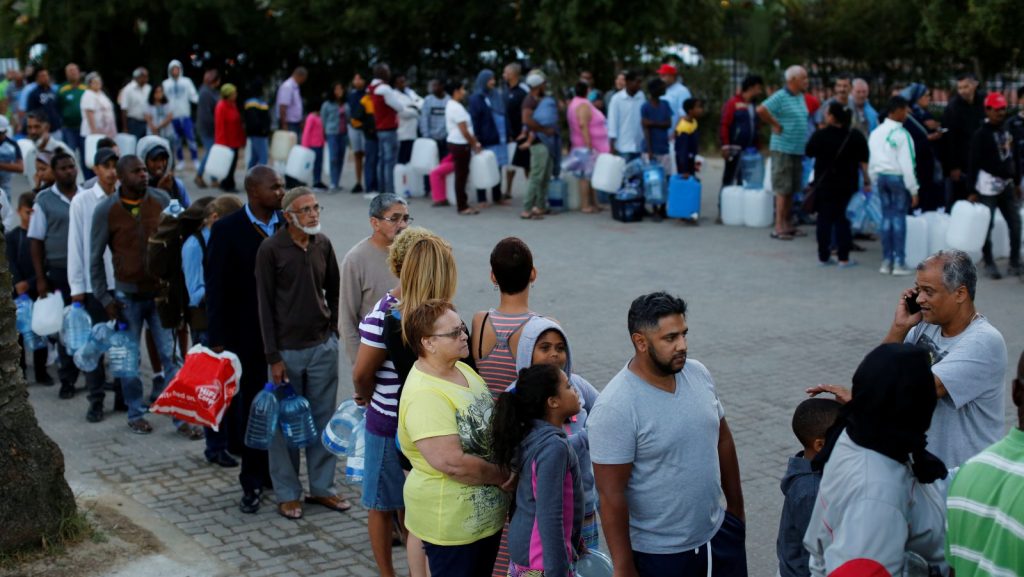South Africa has been experiencing drought conditions for several years and drinking water supplies are threatened across the country. The conditions are most desire in Cape Town, the nation’s second-largest city, where citizens have been facing the prospect of “Day Zero” – the day when spigots run dry.
According to reporting in the online magazine Quartz, water is not an issue just for Cape Town. Water supplies are low throughout the nation.
Restrictions on water use are also in effect in both Durban and Johannesburg, where officials warned recently that usage of water “has increased at an alarming rate.” Levels at dams in both the nation’s Eastern Cape and KwaZulu-Natal provinces have reached dangerously low levels.
Dams that serve Nelson Mandela Bay, the metropolitan area that includes Port Elizabeth, South Africa’s fifth-largest city, were at 26% total combined capacity in the latest tally, roughly half as full as a year ago. The dam that supplies water to much of Durban and its northern suburbs has remained less than 25% full for the past year.
South Africa’s predicament is the result of a combination of factors, some natural and some human created. Much of South Africa has experienced drought since 2013 while per capita water consumption is 50% higher than the global average (US & Canadian water consumption is higher still).
Environmental stewardship, or creation care, is an important aspect of Christian faith and South African Anglicans have been activists in rallying a response to the crisis.
David Meldrum, a priest in Cape Town, shared with us some of the ways the parish he serves has worked to be effective stewards within community.
“We’ve spent the last two Sundays directly addressing the water crisis (not for the first time). I gave some teaching input, but each week we’ve spent some time in small groups in the services talking, sharing water saving ideas, and committing to going through these challenging times as a community not individually.
It’s been quite moving to see, for example, people commit to making sure that all church members have sufficient water and sharing water rations should it come to that. People have an understandable level of fear and unease about what’s happening, but I’m also struck by a genuine trust in God; not in a naive ‘oh it’s all going to be OK’ way, but the rock solid conviction that ‘it is well with my soul’ whatever happens, to quote the old hymn.
Beyond the overall lack of availability, water usage is another point of inequality in South Africa. Christians are also active in addressing these underlying issues of justice. Meldrum expressed hope that this crisis might be a catalyst for change.
“It’s also clear that the common need for water equalises us – SA is a very divided, unequal country and this city reflects that – but we’re noticing that this is bringing down barriers as we share ideas and hopes and fears. Hopefully it will, in the long term, spark action and activism on the sanitation issues in the city that have affected many poorer communities for a long time.”
Craig Stewart works with an organization called The Warehouse which partners with church communities across the Cape Town metropolitan area, helping them think and act effectively in their response to injustice related issues. Two initiatives that they have been leading for the past several years, they believe, will be important for addressing the consequences of the water crisis in Cape Town are RESPOND and MORE THAN PEACE
RESPOND is a city wide ecumenical coalition of churches who work together in the event of large scale disaster incidents in the City, most regularly large scale fires in informal settlements. They have now convened a water crisis team who are working with the city and larger ecumenical networks to develop a coordinated strategy for local church congregations across the city to address the impacts of the crisis.
MORE THAN PEACE is a coalition that emerged in response to unrest at university campuses across the county in recent years. They aim to position the church in helping transform these conflicts, promote peace and nurture dialogue.
More than Peace has begun working with RESPOND to see how the teams they formed can be grown and utilized at water distribution points to address and forestall potential conflicts as people are forced to wait.
Stewart said that his group is also working to develop theological resources for Christians “to help people reflect more deliberately on what it means to follow Christ in these times.”
The Anglican Church in South Africa also has an Environmental Coordinator, the Rev. Rachel Mash. As part of her environmental mission, she has led the group Green Anglicans, a Christian environmental network. She has helped organize a water justice conference with Archbishop Thabo later this month. Additionally, Green Anglicans have created a series of Lenten materials addressing water justice.
There is no single cause and no single solution to the problems facing South Africa. But in a period of global climate change, many other nations will likely face similar crises in the future. Hopefully, we can all learn from South Africa’s experience.
image: People queue to collect water from a spring in the Newlands suburb of Cape Town (Reuters/Mike Hutchings)

